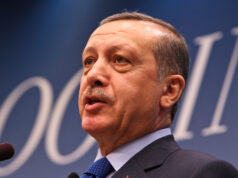U.S. Navy Seals seized control of an unflagged oil tanker from Libyan rebels on Monday in international waters east of Cyprus. The tanker, Morning Glory, is now on its way back to Libya where the rebels will be handed over to the authorities. President Obama ordered the capture of the vessel at the behest of Libya’s central government and Cyprus.
On March 8th, Morning Glory arrived at the rebel-controlled port of al-Sidra in eastern Libya, and began loading about 234,000 barrels of crude oil. The ship was being operated by an Egyptian-based shipping company, but had a temporary agreement to sail under the aegis of North Korea. North Korea disowned the vessel after discovering that the Egyptian shipping company broke the law and that the cargo contained contraband Libyan oil. Officials in Tripoli failed to stop the ship militarily, and after three days the tanker sailed to international waters.

The Arleigh Burke-class guided missile destroyer USS Stout escorts Morning Glory toward Libya on March 17, 2014. (Photo: U.S. Department of Defense) |
Libyan Prime Minister Ali Zeidan took most of the blame for the tanker’s escape. During the crisis he issued a series of ultimatums to prevent the tanker from leaving Libya, including a threat to bomb the ship, despite disastrous environmental consequences. Zeidan’s ineffectiveness led to a parliamentary vote of no confidence in him. The Parliament then appointed the defense minister, Abdullah al-Thinni, to be interim prime minister.
The entire ordeal highlighted Zeidan’s impotence in the face of challenges from federalist militias in Eastern Libya led by military commander Ibrahim Jathran. Jathran was originally in charge of protecting al-Sidra port and Libyan oil for the transitional government formed after the overthrow of Muammar Qaddafi, but deserted to join the federalist cause. He seeks more autonomy especially over territory and oil rights for Eastern Libyans who feel neglected under the current regime.
President Obama’s decision to seize Morning Glory has propelled the U.S. back into the power struggle between Libya’s weak central government and rebel groups. The White House’s choice has outraged militia members, some of whom helped the U.S. confront Islamic extremism. Violence has risen in recent weeks as opposition groups compete for influence in eastern Libya; on Monday, a car bombing in Benghazi killed at least eight soldiers outside of a military academy.





